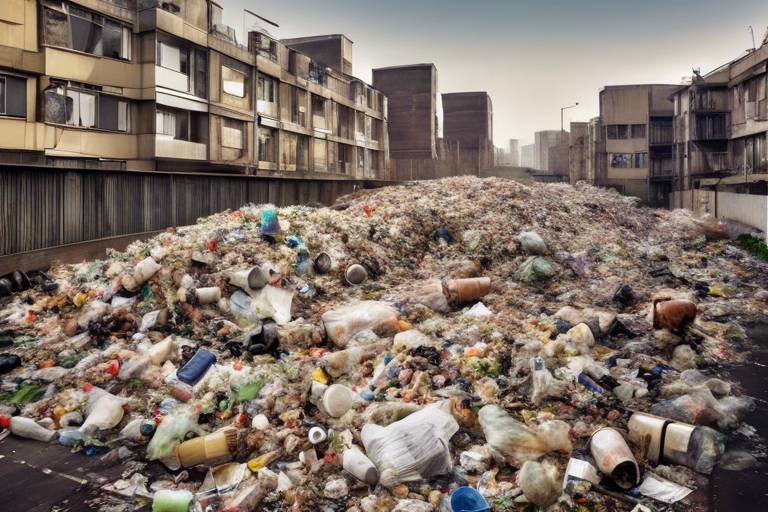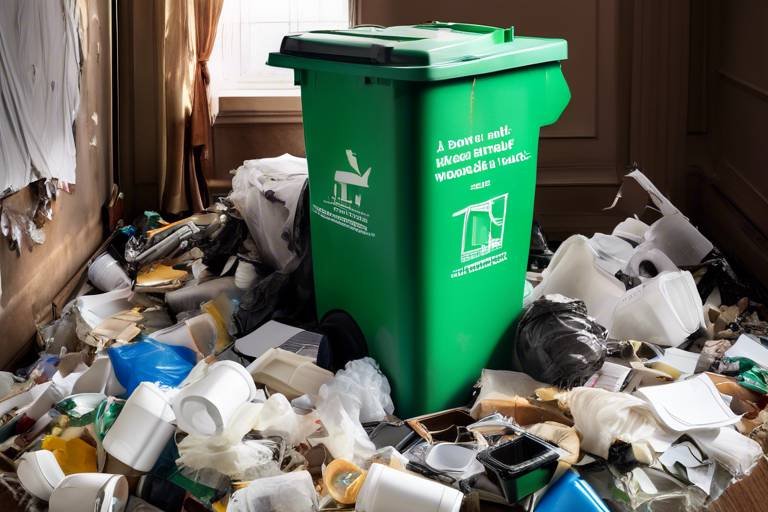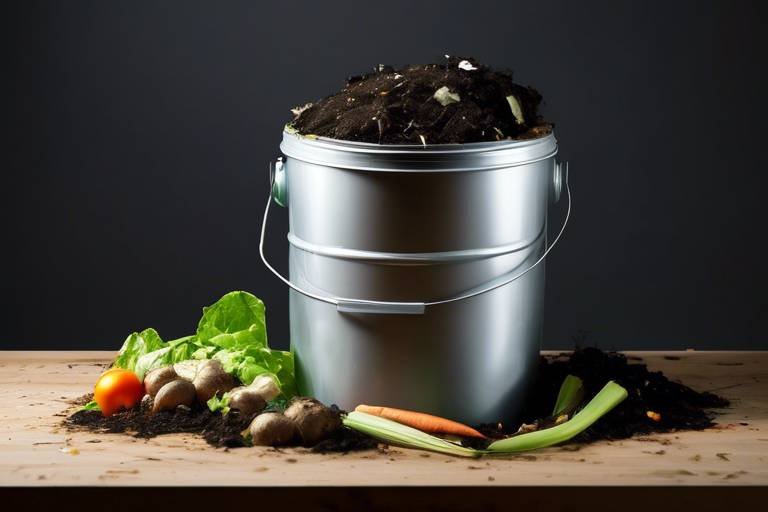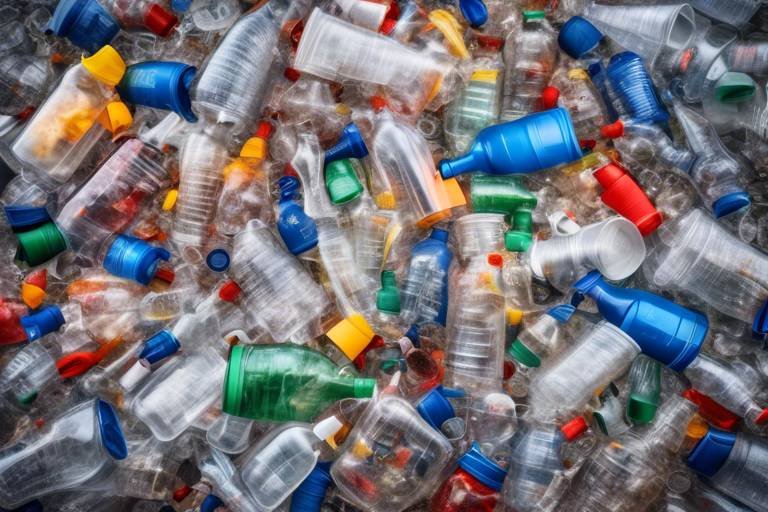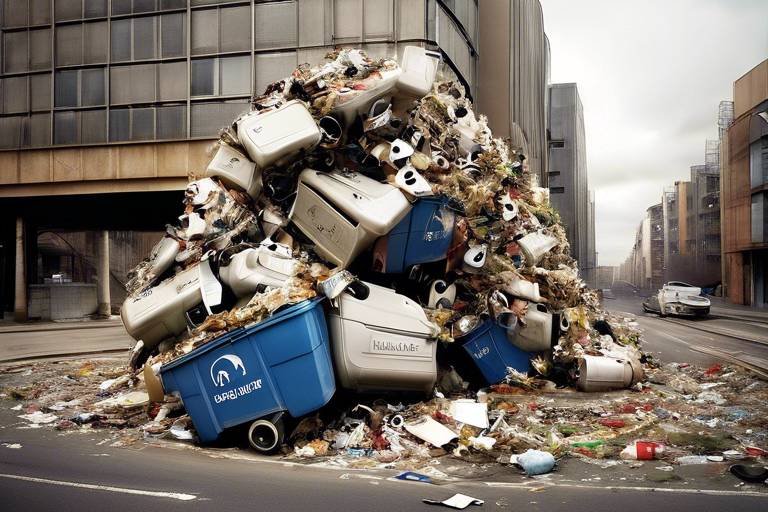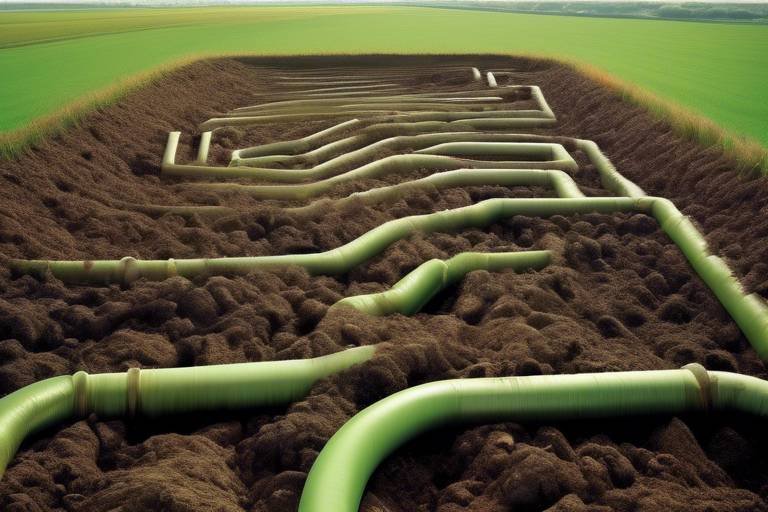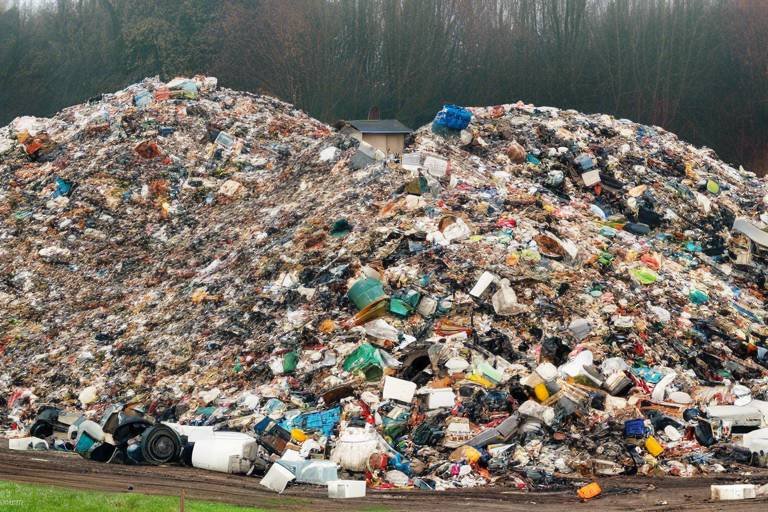The Role of Household Waste in Urban Sustainability
In today's rapidly urbanizing world, the management of household waste has become a critical factor in promoting urban sustainability. As cities expand and populations grow, the volume of waste generated increases exponentially, making it imperative to address how we handle this waste. With effective waste management strategies, we can significantly reduce the negative impacts on the environment, economy, and community well-being. The way we manage our waste not only affects our immediate surroundings but also has long-term implications for future generations.
Imagine a bustling city where every household contributes to a mountain of waste, polluting the air, water, and soil. Now, picture that same city transformed, where waste is minimized, recycled, and composted, creating a cleaner and healthier environment. This transformation is possible through the conscious efforts of individuals and communities working together. By understanding the importance of waste management, we can engage in practices that conserve resources, reduce pollution, and enhance the quality of life in urban areas.
Household waste is often viewed as a burden, but it can also be a valuable resource. When we categorize waste into organic, recyclable, and hazardous materials, we can implement targeted disposal and recycling strategies that not only reduce landfill contributions but also promote sustainability. For instance, organic waste such as food scraps and yard debris can be composted, enriching the soil and supporting local agriculture. This not only diverts waste from landfills but also fosters a sense of community as residents come together to share resources and knowledge about sustainable practices.
However, the journey towards effective waste management is not without its challenges. Many people are still unaware of the benefits of composting or how to properly recycle materials. Overcoming these obstacles is essential for maximizing the potential of waste management initiatives. By educating ourselves and our communities, we can create a culture of sustainability that prioritizes the health of our urban environments.
In conclusion, the role of household waste in urban sustainability is multifaceted. It requires a collective effort from individuals, communities, and local governments to implement practices that minimize waste and promote recycling and composting. As we navigate the complexities of urban living, let us remember that every small action counts. By taking responsibility for our waste and engaging in sustainable practices, we can contribute to the well-being of our communities and the health of our planet.
- What is household waste? Household waste refers to the waste generated from everyday activities in homes, including food scraps, packaging, and hazardous materials.
- Why is waste management important for urban sustainability? Effective waste management reduces pollution, conserves resources, and improves community well-being, contributing to a healthier urban environment.
- How can I reduce my household waste? You can reduce waste by practicing composting, recycling, and minimizing single-use products in your daily life.
- What are the benefits of composting? Composting reduces landfill waste, enriches soil, and fosters community involvement in sustainable practices.
- What types of materials can be recycled? Common recyclable materials include plastics, metals, paper, and glass. Always check local guidelines for specific recycling rules.

The Importance of Waste Management
This article explores the significance of household waste management in promoting urban sustainability, highlighting its impact on the environment, economy, and community well-being.
Effective waste management is not just a mundane task; it is a critical component of urban sustainability. Imagine a city where trash overflows from bins, litter lines the streets, and the air is thick with pollutants. Sounds like a nightmare, right? Well, that’s the reality we face without proper waste management practices. By minimizing environmental pollution and conserving resources, we can create cleaner, healthier urban spaces. This is where the significance of waste management comes into play. It’s about understanding the lifecycle of our waste and recognizing that every item we throw away has a potential impact on our surroundings.
When we look at waste management through the lens of sustainability, we see that it’s not merely about disposal; it encompasses a range of practices that can lead to improved community engagement and better environmental outcomes. For instance, when residents actively participate in recycling and composting, they contribute to reducing the amount of waste sent to landfills. This not only lessens pollution but also conserves natural resources by promoting the recycling of materials. Think of it as a cycle: less waste means less pollution, which leads to healthier communities and a thriving environment.
Moreover, effective waste management can have a significant economic impact. By investing in recycling programs and waste reduction initiatives, cities can save money on landfill costs and create jobs in the recycling and composting sectors. It’s a win-win situation! For example, cities that implement robust recycling programs often see a decrease in waste management costs over time. The money saved can then be redirected to other essential services, such as education or public health initiatives. This creates a ripple effect that benefits everyone in the community.
To further illustrate the importance of waste management, let’s consider some key benefits:
- Environmental Protection: Reduces pollution and conserves natural resources.
- Community Health: Minimizes health risks associated with waste accumulation.
- Economic Savings: Lowers costs related to waste disposal and creates job opportunities.
- Social Responsibility: Fosters a sense of community and encourages sustainable practices.
In conclusion, effective waste management is vital for promoting urban sustainability. It minimizes pollution, conserves resources, and enhances community well-being. By understanding its significance, we can engage in better practices and inspire others to do the same. So, the next time you toss something in the trash, think about where it’s going and how you can make a difference. After all, every small action contributes to a larger goal of sustainability.
Q: Why is waste management important for urban sustainability?
A: Waste management is crucial as it minimizes pollution, conserves resources, and promotes community health, all of which are essential for sustainable urban living.
Q: What are the main types of household waste?
A: Household waste can be categorized into organic waste, recyclable materials, and hazardous waste, each requiring different disposal methods.
Q: How can I get involved in my community's waste management efforts?
A: You can participate by recycling, composting, attending local clean-up events, and advocating for better waste management policies in your area.

Types of Household Waste
When we talk about household waste, it’s not just a pile of garbage waiting to be taken out. In fact, household waste can be categorized into several distinct types, each with its own characteristics and implications for waste management. Understanding these categories is not only crucial for effective disposal but also for fostering a culture of sustainability in our communities. The three primary types of household waste include organic waste, recyclable materials, and hazardous waste. By recognizing the differences among these categories, we can implement appropriate disposal and recycling strategies that significantly reduce our environmental footprint.
First up is organic waste, which primarily consists of food scraps, yard waste, and other biodegradable materials. This type of waste is often seen as a nuisance, but it holds tremendous potential if managed correctly. Instead of ending up in landfills, organic waste can be composted, enriching the soil and supporting local agriculture. Imagine turning your kitchen scraps into nutrient-rich compost that nourishes your garden! This not only reduces landfill contributions but also promotes a vibrant urban ecosystem.
Next, we have recyclable materials. This category includes plastics, metals, glass, and paper. These materials can be repurposed and transformed into new products, which significantly reduces the amount of waste that ends up in landfills. For instance, recycling one ton of paper can save more than 17 trees, 7,000 gallons of water, and 4,100 kilowatts of electricity. However, it’s essential to understand the proper recycling methods to maximize these benefits. Contamination of recyclable materials can lead to entire batches being sent to the landfill, so knowing what can and cannot be recycled is vital.
Lastly, we have hazardous waste. This type of waste includes items like batteries, paint, and certain cleaning products that can pose serious risks to both human health and the environment. Proper disposal of hazardous waste is crucial, as these materials can leach into the soil and water supply, causing long-term damage. Communities must provide designated disposal sites and education to ensure that residents know how to handle these materials safely.
In summary, recognizing the various types of household waste is a key step towards effective waste management. By categorizing waste into organic, recyclable, and hazardous types, we can develop targeted strategies that not only reduce landfill contributions but also promote a healthier urban environment. It’s a win-win situation for our communities and the planet!
- What is organic waste? Organic waste consists of biodegradable materials such as food scraps and yard waste that can be composted.
- How can I recycle effectively? To recycle effectively, ensure that materials are clean and free from contamination. Check local guidelines for what can be recycled.
- What should I do with hazardous waste? Hazardous waste should be taken to designated disposal sites or events organized by local authorities to ensure safe handling.

Organic Waste
Organic waste is a significant component of household waste, primarily consisting of food scraps, yard waste, and other biodegradable materials. In urban areas, where the population density is high, the volume of organic waste can be staggering. It's like having a treasure trove of potential resources right at our doorstep, yet most of it ends up in landfills, contributing to environmental degradation. By recognizing the value of organic waste, we can transform our approach to waste management and sustainability.
One of the most effective ways to manage organic waste is through composting. This natural process not only reduces the amount of waste sent to landfills but also creates nutrient-rich compost that can rejuvenate our gardens and green spaces. Imagine turning your kitchen scraps into black gold for your plants! Composting is more than just a waste disposal method; it’s a way to reconnect with nature and contribute positively to our urban ecosystems.
Composting offers numerous benefits, including:
- Soil Enrichment: Compost adds essential nutrients back into the soil, promoting healthy plant growth.
- Waste Reduction: By composting, households can significantly decrease the volume of waste they produce, which helps in reducing landfill burden.
- Community Engagement: Composting initiatives often bring neighbors together, fostering a sense of community and shared responsibility.
However, despite its many advantages, composting faces certain challenges that can hinder its effectiveness. One major hurdle is contamination. Many people are unaware of what can and cannot be composted, leading to non-biodegradable materials ending up in compost bins. This not only complicates the composting process but also affects the quality of the final product. Education and awareness campaigns can play a crucial role in overcoming this challenge.
Another challenge is the lack of awareness about composting practices. Many urban residents may not know how to start composting or believe they lack the space to do so. This is where community programs and workshops can make a difference, providing hands-on training and resources to help individuals and families engage in composting effectively.
In conclusion, organic waste management through composting is a vital part of promoting urban sustainability. By embracing composting practices, we can not only reduce waste but also create a healthier environment for ourselves and future generations. It’s about making a conscious choice to see waste not as a problem, but as an opportunity to nourish our planet.
1. What types of materials can I compost?
You can compost a variety of organic materials, including fruit and vegetable scraps, coffee grounds, eggshells, grass clippings, and leaves. However, avoid composting meat, dairy, and oils, as these can attract pests.
2. How long does it take for compost to be ready?
Typically, compost can take anywhere from a few weeks to several months to fully decompose, depending on factors such as the materials used and the composting method.
3. Can I compost in an apartment?
Absolutely! There are many indoor composting solutions, such as worm bins or bokashi composting, that are perfect for apartment dwellers.
4. What should I do if my compost smells bad?
Bad odors usually indicate that your compost is not balanced. Ensure you have a good mix of green (nitrogen-rich) and brown (carbon-rich) materials, and turn the pile to aerate it.
5. How can I get my community involved in composting?
Start by organizing workshops, sharing resources, and even creating a community composting program. Engaging your neighbors can foster a collaborative spirit and make composting a community effort.

Composting Benefits
Composting is like nature's recycling system, turning organic waste into black gold for our gardens. When you think about it, it’s really amazing how something as simple as food scraps can transform into nutrient-rich soil that feeds plants and supports local ecosystems. By composting, we not only reduce the amount of waste that ends up in landfills but also create a sustainable cycle that benefits our environment.
One of the most significant benefits of composting is the reduction of landfill waste. Did you know that nearly 30% of what we throw away is organic material? By composting, we can divert this waste from landfills, where it would otherwise decompose anaerobically, producing harmful greenhouse gases like methane. Instead, when we compost, organic waste breaks down naturally, enriching the soil without the negative environmental impact.
Furthermore, composting enriches the soil, making it healthier and more productive. This is crucial for urban agriculture, where space is often limited. Healthy soil leads to healthy plants, which not only produce more food but also require fewer chemical fertilizers and pesticides. This creates a ripple effect that promotes biodiversity and supports local wildlife, making our cities greener and more vibrant.
Another fantastic aspect of composting is its ability to foster community involvement. When neighbors come together to create composting programs, it builds a sense of community and shared responsibility. Imagine a neighborhood where everyone participates in composting, sharing tips and even compost! This not only strengthens community bonds but also educates residents on sustainable practices, making them more aware of their environmental impact.
However, to fully harness the benefits of composting, we must also address some common challenges. Issues such as contamination—when non-compostable materials are mixed in—can hinder the composting process. Additionally, a lack of awareness about what can and cannot be composted often leads to frustration. To overcome these obstacles, communities can hold workshops to educate residents about proper composting practices, ensuring that everyone is on the same page.
In summary, composting is not just a method of waste disposal; it’s an essential practice for urban sustainability. By reducing landfill waste, enriching the soil, fostering community engagement, and overcoming challenges, composting can significantly enhance the health of our urban environments. So, why not start composting today? It’s a small change that can lead to a big impact!
- What materials can I compost? You can compost fruit and vegetable scraps, coffee grounds, eggshells, yard waste, and more. Just avoid meat, dairy, and oily foods.
- How long does it take to make compost? Composting can take anywhere from a few weeks to several months, depending on factors like temperature, moisture, and the materials used.
- Can I compost indoors? Yes! There are various indoor composting methods, such as using a worm bin or a countertop composting system.
- What are the signs that my compost is ready? When your compost is dark, crumbly, and has an earthy smell, it’s ready to use!

Challenges in Composting
Composting is an incredible way to reduce waste, enrich soil, and promote urban sustainability, but it doesn't come without its hurdles. One of the major challenges faced by individuals and communities is contamination. This occurs when non-compostable materials, such as plastics or metals, are mixed in with organic waste. Contamination not only hampers the composting process but can also lead to the entire batch being deemed unusable. Imagine putting all that effort into composting, only to find out your hard work has gone to waste because of a few misplaced items!
Another significant obstacle is the lack of awareness and education surrounding composting practices. Many people are simply unaware of what can and cannot be composted. For instance, did you know that citrus peels can be problematic in large quantities? They can create an overly acidic environment that may hinder the composting process. This lack of knowledge can lead to frustration and ultimately result in people abandoning their composting efforts altogether.
Additionally, space limitations can be a real barrier, especially in urban settings where residents may have limited outdoor space. Not everyone has a backyard to set up a compost bin, and those living in apartments might struggle to find a suitable location for a composting setup. However, there are innovative solutions like indoor composting systems that utilize worms or bokashi methods, which can help overcome this challenge.
Finally, time and maintenance can deter individuals from composting. Many people think composting requires a significant time investment, from turning the pile to monitoring moisture levels. While it's true that composting does require some attention, the rewards far outweigh the effort. Setting up a simple compost bin and making it a part of your routine can make the process much more manageable.
In summary, while composting presents several challenges, understanding these obstacles is the first step toward overcoming them. By raising awareness, providing education, and promoting innovative solutions, we can empower more individuals and communities to engage in composting practices. This not only benefits the environment but also fosters a greater sense of community responsibility and connection.
- What can I compost? Most organic materials like fruit and vegetable scraps, coffee grounds, eggshells, and yard waste are compostable. Avoid meat, dairy, and oily foods.
- How long does composting take? Composting can take anywhere from a few weeks to several months, depending on factors like temperature, moisture, and the materials used.
- Can I compost in an apartment? Yes! There are many indoor composting options available, such as worm bins or bokashi systems, perfect for small spaces.
- What should I do if my compost smells bad? Bad odors usually indicate that the compost is too wet or contains too many nitrogen-rich materials. Adding dry leaves or cardboard can help balance it out.

Recyclable Materials
Recyclable materials are an essential component of effective waste management strategies in urban areas. They include a variety of items that, when properly sorted and processed, can be transformed into new products, thereby conserving natural resources and reducing the volume of waste sent to landfills. The most common types of recyclable materials are plastics, metals, paper, and glass. Each of these categories has its own recycling processes and benefits, making it crucial for residents to understand how to dispose of them correctly.
For instance, plastics are ubiquitous in our daily lives, found in everything from packaging to household items. However, not all plastics are created equal. They are categorized by resin identification codes, which range from 1 to 7, indicating the type of plastic and its recyclability. Knowing which codes are accepted by local recycling programs can significantly enhance recycling rates and minimize contamination.
| Resin Code | Type of Plastic | Common Uses | Recyclability |
|---|---|---|---|
| 1 | Polyethylene Terephthalate (PET) | Beverage bottles, food containers | Widely recyclable |
| 2 | High-Density Polyethylene (HDPE) | Milk jugs, detergent bottles | Widely recyclable |
| 3 | Polyvinyl Chloride (PVC) | Pipes, clear food packaging | Rarely recycled |
| 4 | Low-Density Polyethylene (LDPE) | Bags, some food wraps | Limited recycling options |
| 5 | Polypropylene (PP) | Yogurt containers, straws | Increasingly recyclable |
| 6 | Polystyrene (PS) | Disposable coffee cups, plastic food boxes | Not commonly recycled |
| 7 | Other | Various other plastics | Varies by type |
Moreover, metals such as aluminum and steel are highly recyclable and can be repurposed indefinitely without losing quality. Recycling metals not only saves energy—up to 95% for aluminum compared to producing it from raw materials—but also reduces greenhouse gas emissions. This is a win-win for both the environment and the economy.
Paper recycling is another critical aspect of waste management. It involves collecting used paper products, which can then be processed into new paper. This not only conserves forests but also uses less energy and water compared to making paper from virgin materials. However, it is vital to ensure that paper products are clean and dry, as contamination can hinder the recycling process.
Finally, glass is 100% recyclable and can be recycled endlessly without loss in quality or purity. The recycling process for glass is straightforward: it is crushed, melted, and molded into new products. Encouragingly, many communities have implemented container deposit schemes to incentivize glass recycling, significantly increasing recycling rates.
In conclusion, understanding and participating in the recycling of these materials is crucial for urban sustainability. By making informed choices about how we handle recyclable materials, we can all contribute to a cleaner, greener city. Remember, every little bit counts, and your efforts can lead to significant changes in waste management practices!
- What types of materials can be recycled? Most communities accept plastics, metals, paper, and glass for recycling. Check local guidelines for specifics.
- How can I ensure my recyclables are not contaminated? Rinse containers and avoid mixing different types of materials to reduce contamination.
- Is recycling worth it? Absolutely! Recycling conserves natural resources, saves energy, and reduces landfill waste, benefiting both the environment and economy.
- What should I do with items that cannot be recycled? Consider donating, repurposing, or disposing of them properly according to local waste management guidelines.

The Impact of Waste on Urban Environment
Household waste is not just a byproduct of our daily lives; it is a significant factor that shapes the urban environment we inhabit. When we toss out our trash, we often overlook the profound implications it has on pollution levels, public health, and the overall sustainability of our cities. The truth is, improper waste disposal can lead to a cascade of environmental issues that affect not only the immediate surroundings but also the broader ecological balance. Have you ever thought about where your waste goes after you throw it away? This question is crucial in understanding the impact of waste on urban environments.
One of the most alarming ways that waste affects urban areas is through pollution. When waste is dumped in landfills or improperly disposed of, it can release harmful substances into the air, soil, and water. These pollutants can lead to serious health risks for residents, including respiratory issues, skin diseases, and even long-term chronic conditions. For instance, the leachate from landfills—a toxic liquid that forms when waste decomposes—can contaminate groundwater, posing a threat to drinking water supplies. Moreover, the accumulation of waste often attracts pests and vermin, which can carry diseases and create further health hazards.
Additionally, the aesthetic degradation of urban spaces is a direct consequence of inadequate waste management. Streets littered with trash not only detract from the beauty of our cities but also diminish property values and can discourage tourism. Imagine walking through a park or neighborhood that is cluttered with garbage; it’s not just unpleasant, it’s demoralizing. This visual pollution can lead to a sense of neglect and loss of community pride among residents. In fact, studies have shown that areas with high levels of litter and waste often experience increased crime rates, as the neglect of public spaces can foster further antisocial behavior.
Furthermore, the economic implications of waste mismanagement cannot be ignored. Cities spend millions of dollars annually on waste collection, disposal, and cleanup efforts. These funds could be better allocated to community development, infrastructure improvements, or educational programs. By investing in effective waste management strategies, cities can not only reduce costs but also promote a healthier environment. For example, implementing recycling programs can create jobs, stimulate local economies, and conserve resources. It's a win-win situation that benefits everyone involved.
In light of these issues, it becomes clear that addressing waste management is not merely an environmental concern; it is a comprehensive approach that encompasses public health, community well-being, and economic sustainability. To combat the negative impacts of waste, cities must prioritize effective waste management strategies that engage residents and promote responsible disposal practices. This could involve educational campaigns, community clean-up events, and incentives for recycling and composting. By fostering a culture of sustainability, we can collectively work towards creating healthier urban environments.
- What are the main types of household waste? Household waste can be categorized into organic, recyclable, and hazardous materials.
- How does improper waste disposal affect public health? Improper disposal can lead to pollution, which can cause respiratory issues, skin diseases, and other health problems.
- What can communities do to improve waste management? Communities can organize clean-up events, educational campaigns, and recycling initiatives to promote better waste practices.
- Why is composting important for urban sustainability? Composting reduces landfill waste, enriches soil, and supports local agriculture, contributing to a sustainable urban ecosystem.

Pollution and Health Risks
When we think about urban living, the hustle and bustle of city life often overshadows a crucial aspect that directly affects our well-being: pollution from household waste. It's easy to overlook how our daily habits contribute to a larger problem, but the reality is startling. Improper waste disposal can lead to a myriad of environmental issues and health risks that impact not just individuals, but entire communities.
First, let's consider the types of pollution we often encounter due to mishandled waste. Air pollution is one of the most significant concerns. When waste decomposes in landfills, it releases harmful gases like methane, which is a potent greenhouse gas. This not only contributes to climate change but can also lead to respiratory problems for those living nearby. Similarly, water pollution occurs when waste leaches into our water systems, contaminating drinking water sources and harming aquatic life. Imagine throwing a plastic bottle into a river; it doesn’t just disappear; it affects the entire ecosystem.
Moreover, soil contamination is another critical issue. Household hazardous waste, such as batteries and chemicals, can seep into the ground, affecting the quality of soil and, consequently, the food we grow. This is particularly alarming for urban gardens and farms that rely on healthy soil to produce safe, nutritious food. The cycle of pollution continues as contaminated soil can lead to food safety issues, posing risks to public health.
Health risks associated with pollution from household waste are equally concerning. Exposure to pollutants can lead to a range of health problems, including:
- Respiratory Issues: Poor air quality can exacerbate conditions like asthma and bronchitis.
- Skin Irritations: Contact with contaminated soil or waste can cause rashes and other skin conditions.
- Long-term Diseases: Prolonged exposure to hazardous waste can increase the risk of cancers and other chronic diseases.
As urban dwellers, we must recognize our role in this equation and take action. Engaging in proper waste management practices can significantly mitigate these risks. Simple steps like segregating waste into organic, recyclable, and hazardous categories can make a big difference. Not only does it reduce the amount of waste sent to landfills, but it also minimizes the potential for pollution. Furthermore, community initiatives that promote awareness about the dangers of improper waste disposal can empower residents to take charge of their environment.
In conclusion, the connection between household waste, pollution, and health risks is undeniable. By understanding these relationships, we can foster healthier urban environments and promote sustainable practices. After all, a cleaner city is a healthier city, and it starts with each one of us making conscious choices about our waste.
- What are the main types of household waste? Household waste can be categorized into organic, recyclable, and hazardous materials.
- How does improper waste disposal affect health? It can lead to air and water pollution, which in turn causes respiratory issues, skin irritations, and long-term diseases.
- What can I do to reduce household waste? Segregate waste, compost organic materials, and participate in local recycling programs.
- Why is community engagement important in waste management? It fosters a sense of responsibility and encourages sustainable practices among residents.

Community Engagement in Waste Management
When it comes to managing household waste, community engagement is not just a nice-to-have; it's a game-changer. Imagine a neighborhood where everyone is actively involved in reducing waste, recycling, and composting. This sense of community not only makes waste management more effective but also fosters a spirit of collaboration and responsibility among residents. When people come together to tackle waste issues, they create a ripple effect that can lead to significant changes in behavior and attitudes toward sustainability.
One of the best ways to encourage community participation is through education. Workshops, community meetings, and social media campaigns can inform residents about the importance of waste management and the impact of their actions. For instance, a local workshop could teach families how to separate their waste correctly, emphasizing the significance of recycling and composting. When people understand the “why” behind waste management practices, they are more likely to engage and participate.
Furthermore, engaging the community can lead to innovative waste management solutions. For example, local groups can organize clean-up events, where residents come together to clean up parks or streets, fostering a sense of ownership over their environment. These events not only beautify the neighborhood but also raise awareness about littering and waste disposal. Additionally, communities can establish recycling programs or composting initiatives tailored to their specific needs and resources.
However, it’s essential to recognize that community engagement in waste management isn’t without its challenges. Some residents may feel indifferent or overwhelmed by the information. To combat this, local governments and organizations should focus on making participation as easy and accessible as possible. This could mean providing free compost bins or offering curbside recycling services. By lowering the barriers to participation, communities can encourage more residents to get involved.
Ultimately, the key to successful community engagement in waste management lies in building a culture of sustainability. This means not only educating residents but also celebrating their efforts and achievements. Recognizing individuals and groups for their contributions can inspire others to join in. For example, a community could host an annual sustainability fair where residents showcase their recycling and composting efforts, share tips, and even compete for prizes. Such events can create a sense of camaraderie and motivate even the most reluctant participants to take action.
In conclusion, community engagement is vital for effective waste management. By educating residents, fostering collaboration, and celebrating successes, communities can create a sustainable environment that benefits everyone. When individuals feel connected to their community and its goals, they are more likely to take responsibility for their waste, leading to a cleaner, healthier urban space.
- How can I get involved in my community's waste management efforts?
Look for local organizations or initiatives focused on sustainability. Attend community meetings or workshops to learn more about how you can contribute. - What are the benefits of composting?
Composting reduces waste sent to landfills, enriches soil, and supports local agriculture, contributing to a healthier urban ecosystem. - How can I educate others about waste management?
Share information through social media, organize workshops, or simply have conversations with friends and neighbors about the importance of sustainable practices.
Frequently Asked Questions
- What is household waste and why is it important for urban sustainability?
Household waste consists of the materials we discard from our homes, including food scraps, plastics, and paper. It's crucial for urban sustainability because effective waste management can minimize environmental pollution and conserve valuable resources. By understanding and managing our waste better, we can contribute to healthier urban environments and promote community well-being.
- What types of household waste are there?
Household waste can be categorized into several types: organic waste (like food scraps), recyclable materials (such as plastics, metals, and paper), and hazardous waste (like batteries and chemicals). Recognizing these categories is essential for implementing appropriate disposal and recycling strategies, which ultimately help reduce the burden on landfills.
- How can I manage organic waste effectively?
You can manage organic waste by composting. Composting involves collecting food scraps and yard waste and turning them into nutrient-rich soil. This process not only reduces the amount of waste sent to landfills but also enriches the soil for gardening, supporting local agriculture and promoting a sustainable urban ecosystem.
- What are the benefits of composting?
Composting has numerous benefits! It reduces landfill contributions, provides nutrient-rich soil for gardens, and fosters community involvement. Plus, it encourages environmentally friendly practices among residents, making it a win-win for both the environment and the community.
- What challenges might I face while composting?
Some common challenges in composting include contamination from non-compostable materials and a general lack of awareness about proper composting practices. Overcoming these obstacles is key to maximizing the potential of composting in urban sustainability efforts.
- How does recycling contribute to urban sustainability?
Recycling plays a vital role in urban sustainability by reducing the amount of waste that ends up in landfills. By recycling materials like plastics, metals, and paper, we can conserve resources, reduce pollution, and promote a circular economy where materials are reused rather than discarded.
- What are the environmental impacts of improper waste disposal?
Improper waste disposal can lead to significant environmental issues, including pollution of land, water, and air. This not only harms wildlife and ecosystems but also poses health risks to humans. Addressing these problems is essential for creating healthier, more sustainable cities.
- How can communities engage in waste management initiatives?
Communities can engage in waste management initiatives through educational programs, community clean-up events, and local recycling drives. By fostering a sense of responsibility and collaboration, community members can work together to find innovative solutions to urban waste challenges, ultimately leading to a more sustainable future.

